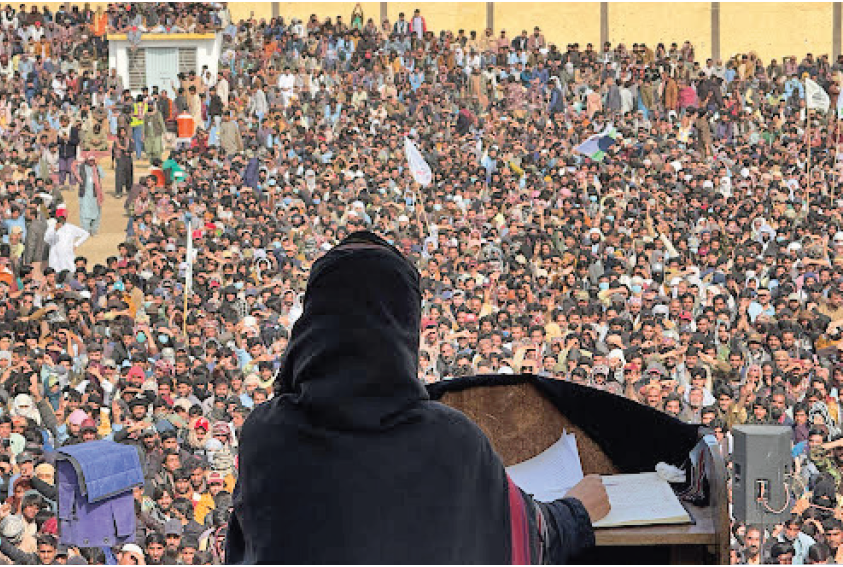Balochistan, Pakistan’s largest province by area and one with a turbulent political history, has recently witnessed a significant political shift under the leadership of Dr. Mahrang Baloch. Her grassroots mobilisation efforts have drawn widespread attention, setting her apart from the established political players in the province. Her growing popularity has not only unsettled the traditional Baloch nationalist parties, but it has also sparked discussions about the future of politics in Balochistan.
The Emergence of Dr. Mahrang Baloch
Dr. Mahrang Baloch has spearheaded a series of protest movements across Balochistan, rallying the people behind her call for change. What makes her rise particularly noteworthy is her refusal to engage in parliamentary politics, which distinguishes her from most Baloch political leaders. Her protests are aimed at public mobilisation rather than contesting elections, positioning her as a new kind of leader in the province.
Her stance resonates with many who are disillusioned with the established political order. Dr. Mahrang’s gatherings in key areas of Balochistan have drawn considerable crowds, suggesting widespread support for her cause. However, despite her success in mobilising the masses, Dr. Mahrang has made it clear that she does not seek solution of issues through conventional political means. This has led to speculation about her ultimate goals, but it is evident that her movement challenges the traditional power structures in the province.
Impact on Established Political Parties
The growing influence of Mahrang has unsettled two major nationalist political parties in Balochistan: the Balochistan National Party (BNP-Mengal) and the National Party (NP). These parties, led by Sardar Akhtar Mengal and Dr. Abdul Malik Baloch, respectively, have long been central players in Balochistan’s parliamentary politics. Both leaders have contested elections since the establishment of Balochistan as a province and have played a significant role in shaping its political landscape. However, Mahrang’s movement presents a new kind of opposition that does not rely on parliamentary structures, giving the traditional parties a run for their money.
The emergence of Mahrang and the growing discontent with established political leaders have had real consequences. Sardar Akhtar Mengal, the leader of BNP, recently announced his departure from the parliament, a move that some attribute to the rising influence of Mahrang. While the BNP still holds seats in both the Balochistan Assembly and the Senate, Mengal’s decision to step down from parliamentary politics is a significant development. It suggests that the traditional political elites in Balochistan are feeling the pressure from new, non-parliamentary movements like the one led by Mahrang.
Declining Popularity of Established Leaders
The growing popularity of Mahrang Baloch coincides with the declining influence of veteran political leaders in Balochistan. Both Sardar Akhtar Mengal and Dr. Abdul Malik Baloch have faced criticism for their inability to address key issues affecting the province, including missing persons, poverty, unemployment, and insurgency. For years, the two leaders have been central figures in Balochistan’s parliamentary politics, with their parties often playing a role in provincial or national governance. Yet, many people in Balochistan feel that these leaders have not delivered the promised progress.
Sardar Akhtar Mengal’s decision to exit parliament is symbolic of this decline. While his party remains active, his departure signals a shift in the political dynamic. Dr. Abdul Malik Baloch, the former chief minister and leader of the National Party, also faces a similar challenge. His party has struggled to maintain its electoral base, particularly as younger and more progressive voices like Mahrang begin to shape the political narrative.
A History of Political Unrest in Balochistan
Balochistan has a long history of political unrest, much of it rooted in grievances over underdevelopment and the marginalisation of its people. Over the decades, the province has seen multiple insurgencies, military operations, and political crises. The insurgent groups often advocate for greater autonomy, which has made Balochistan a focal point of national security concerns.
The province’s political landscape has also been shaped by incidents of violence and conflict between militant groups and the state. Many political leaders, including those from the BNP and NP, have had to navigate this tense environment while trying to maintain their relevance. However, the inability of these parties to fully address Balochistan’s core issues has contributed to the rise of new movements like that of Mahrang Baloch.
Her political movement marks a significant shift in Balochistan’s political landscape. Her ability to rally the people without relying on parliamentary structures challenges the established political order in the province. As the influence of traditional political leaders wanes, her rise suggests a new chapter in Balochistan’s ongoing struggle for justice and development. Whether Mahrang’s movement will lead to lasting political change remains to be seen, but her popularity underscores the desire for a different kind of politics in the province.
The writer is a senior journalist based in Quetta.



